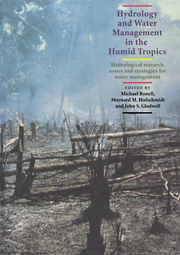 Hydrology and Water Management in the Humid Tropics
Hydrology and Water Management in the Humid Tropics Book contents
- Frontmatter
- Contents
- List of Authors
- Foreword by Federico Mayor, Director-General, UNESCO
- Preface
- Cartographic Credit
- Acknowledgements
- SECTION I INTRODUCTION
- SECTION II HUMID TROPICS SETTING
- SECTION III REGIONAL HYDROLOGY
- SECTION IV PHYSICAL PROCESSES
- 11 Recent Scientific Developments and Research Needs in Hydrological Processes of the Humid Tropics
- 12 Groundwater Systems in the Humid Tropics
- 13 Perspectives on the Hydrology and Water Resource Management of Natural Freshwater Wetlands and Lakes in the Humid Tropics
- 14 Erosion and Sedimentation
- 15 Water Quality Issues in the Humid Tropics
- 16 Ecological Characteristics of Tropical Fresh Waters: An Outline
- SECTION V PHYSICAL PROCESSES – HUMAN USES: THE INTERFACE
- SECTION VI MANAGEMENT ISSUES
- SECTION VII APPENDICES
- Place index
12 - Groundwater Systems in the Humid Tropics
Published online by Cambridge University Press: 23 December 2009
- Frontmatter
- Contents
- List of Authors
- Foreword by Federico Mayor, Director-General, UNESCO
- Preface
- Cartographic Credit
- Acknowledgements
- SECTION I INTRODUCTION
- SECTION II HUMID TROPICS SETTING
- SECTION III REGIONAL HYDROLOGY
- SECTION IV PHYSICAL PROCESSES
- 11 Recent Scientific Developments and Research Needs in Hydrological Processes of the Humid Tropics
- 12 Groundwater Systems in the Humid Tropics
- 13 Perspectives on the Hydrology and Water Resource Management of Natural Freshwater Wetlands and Lakes in the Humid Tropics
- 14 Erosion and Sedimentation
- 15 Water Quality Issues in the Humid Tropics
- 16 Ecological Characteristics of Tropical Fresh Waters: An Outline
- SECTION V PHYSICAL PROCESSES – HUMAN USES: THE INTERFACE
- SECTION VI MANAGEMENT ISSUES
- SECTION VII APPENDICES
- Place index
Summary
ABSTRACT
Aquifers underlie large areas of the humid tropics. Because of their widespread distribution, they can often be developed close to the location of demand, with modest pumping and reticulation costs, to produce groundwater of excellent chemical and microbiological quality requiring little treatment. These factors are leading to increased interest and rapid development of groundwater resources. Groundwater systems characteristic of the humid tropics fall into five main types, major alluvial formations, basement regoliths, intermontane valley-fill, active volcanic arcs and karstic limestones. The principal features of each of these are described and the main problems which arise in each case in the exploitation and management of groundwater resources are indicated. In the humid tropics, the close association between groundwater and surface water and the generally shallow water table make groundwater a valuable resource which, in some cases, is highly vulnerable to pollution from a range of human activities.
INTRODUCTION
Significance of groundwater
Aquifers underlie geographically large areas of the humid tropics. Because of this widespread distribution, their groundwater resources can often be tapped close to the location of water demand, thereby minimizing reticulation costs, at least for supplies up to moderate volume. Groundwater has other advantages for water supply development. Given adequate protection, it has excellent microbiological and organic quality, and requires minimal treatment. Although certain naturally- occurring dissolved chemical constituents can impart an unacceptable quality or a health risk for domestic supply, groundwater with these characteristics are of limited geographical distribution. The capital cost of groundwater development is thus relatively modest and the land requirements are minimal. Finally, the resource lends itself to flexible development, capable of being phased with rising demand.
- Type
- Chapter
- Information
- Hydrology and Water Management in the Humid TropicsHydrological Research Issues and Strategies for Water Management, pp. 261 - 272Publisher: Cambridge University PressPrint publication year: 1993
- 5
- Cited by


